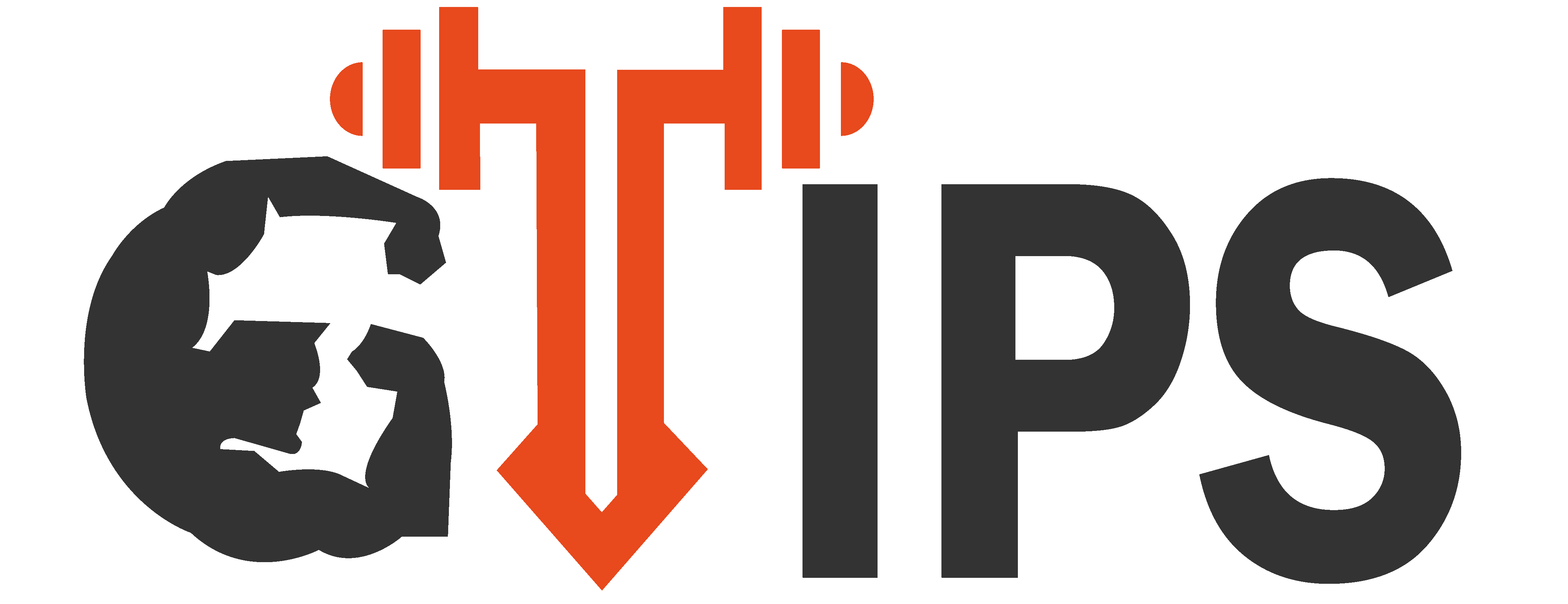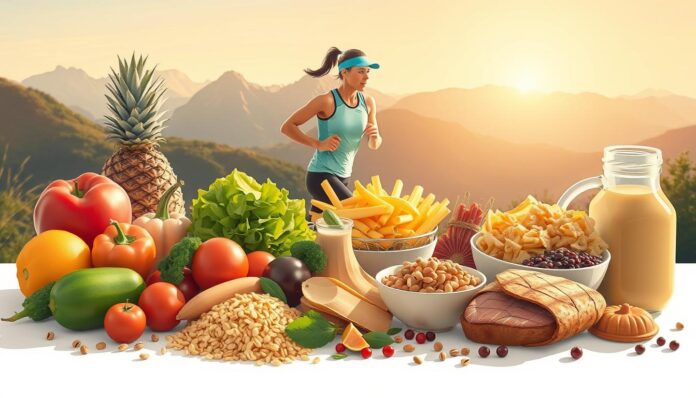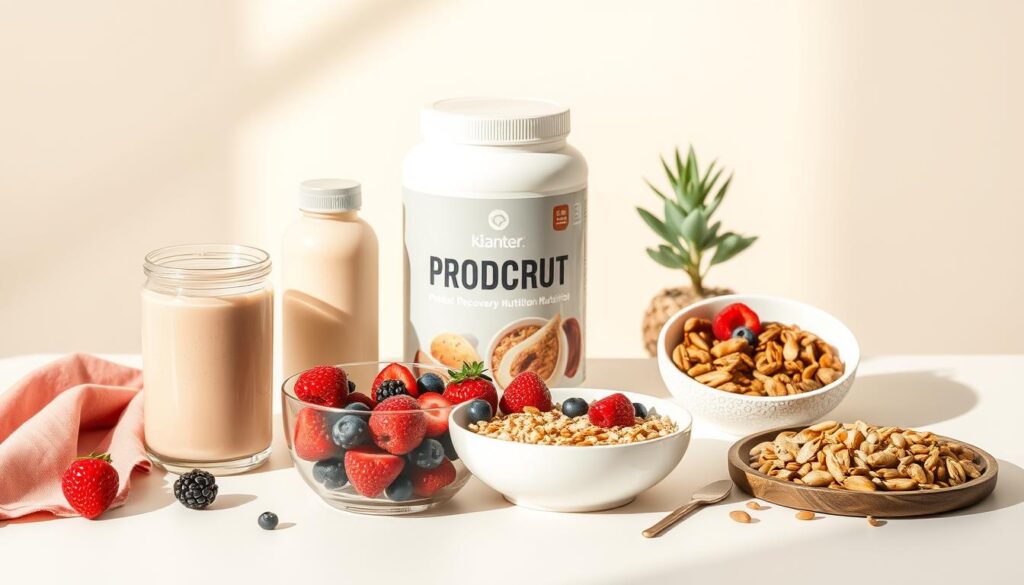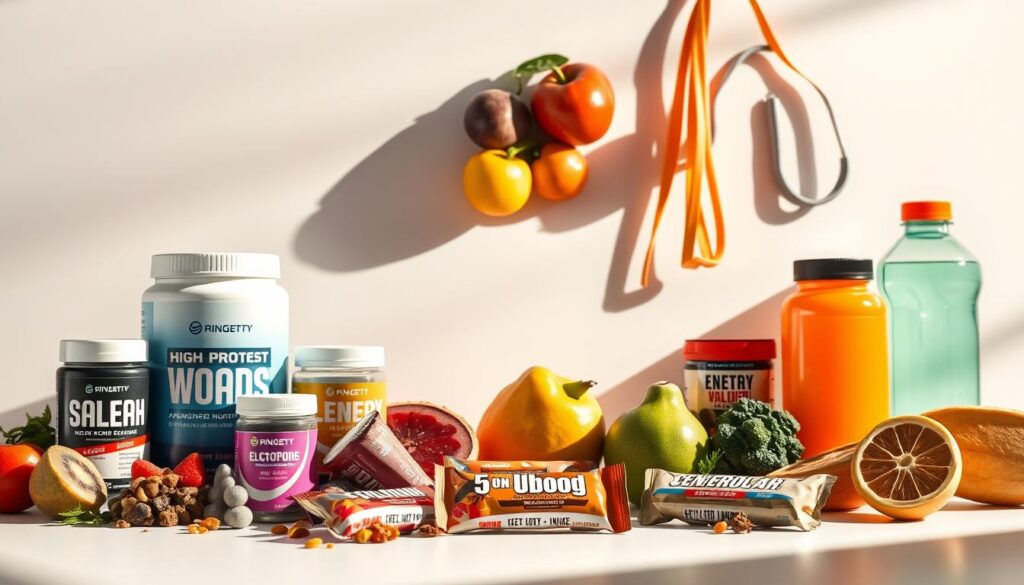Imagine you’re about to compete, your heart is racing, and you wonder what you’ve been eating. This is a common feeling for many athletes. They often ignore their diet, even though it’s key for their performance and recovery. Good nutrition tips can help you win or struggle.
Your body needs the right mix of nutrients to perform well. Knowing what you need is essential for better endurance and strength. This article will give you important tips to improve your diet for top performance.
Learning about carbs, proteins, hydration, and recovery nutrition can change your game. Good nutrition lets you reach your full athletic ability.
Key Takeaways
- Most athletes need 500 to 1,000 more calories each day than regular people.
- Carbs should make up 55% to 60% of your daily calories for best results.
- Drinking water every 15 to 20 minutes is key during workouts.
- Protein is important after workouts to help muscles heal.
- Adjust your diet based on your sport.
- Keep track of your calories to avoid malnutrition and energy loss.
Understand Your Nutritional Needs
Knowing what nutrients athletes need is key to better performance and recovery. Focusing on macronutrients and micronutrients boosts energy and prevents deficiencies. It’s important to tailor your diet to your sport to reach your fitness goals.
Importance of Macronutrients
Macronutrients include carbs, proteins, and fats. Carbs should make up most of your meals, giving you energy for workouts. Proteins help repair muscles and should be a smaller part of your diet.
Power athletes need a lot of protein, up to 2 grams per kilogram of body weight. Eating often, every 3 to 4 hours, helps keep your energy up.
Role of Micronutrients
Micronutrients like iron and vitamin D are important for better performance and bone health. Female athletes and runners need to watch their iron intake to avoid energy drops. Vitamin D is key for strong bones, which is important in low sunlight areas.
Having enough vitamins and minerals keeps you healthy and helps you perform better.
Tailoring Your Diet Based on Sport
Adjusting your diet to fit your sport’s needs is essential. The United States Olympic & Paralympic Committee (USOPC) provides meal examples based on training intensity. Working with registered dietitians helps create a personalized nutrition plan.
This plan meets your specific needs based on your sport. For more nutrition tips, check out nutrition tips for workouts.
Pre-Workout Nutrition Strategies
Knowing the right foods and when to eat them is key for better energy and performance. Pre-Workout Nutrition helps your body get the fuel it needs. This part talks about the best meal times and foods for athletes.
Best Foods to Fuel Your Body
To boost your performance, eat a mix of carbs and proteins. Good choices include:
- Peanut butter and banana sandwiches
- Greek yogurt with berries
- Oatmeal with fruit
- Rice cakes topped with hummus or turkey
Eat 1-4 grams of carbs per kilogram of body weight 1-4 hours before exercise. For long sports, eat 3-4 grams per kilogram. For endurance and “stop-and-go” sports, eat 2-3 grams. Strength training needs less, about 0.5-2 grams. A good meal before exercise can really help your Fueling for Sports.
Timing Your Meals for Optimal Performance
When you eat is as important as what you eat. Here are some guidelines for pre-workout meals:
| Time Before Workout | Carbohydrate Intake | Protein Intake |
|---|---|---|
| 3-4 hours | 100-150g | 30-40g |
| 1-2 hours | 60-90g | 20-30g |
| Less than 1 hour | 20-50g | 10-15g |
Drinking enough water is also key; aim for 5-10 ml per kilogram of body weight 2-4 hours before exercise. Staying hydrated boosts your athletic performance. Active men should drink about 3 liters a day, while active women should aim for 2.2 liters. Good meal timing and hydration improve performance and help with recovery after exercise. Learn more about pre-workout nutrition strategies to improve your training.
Hydration Principles for Athletes
Hydration is key for athletes to perform well. Knowing when you’re dehydrated can help you stay focused. Even a small drop in body water can cause problems.
It’s not just about drinking water. Athletes also need to watch their electrolyte levels. This is important during hard training or games.
Signs of Dehydration
It’s important to know the signs of dehydration. This helps keep your performance up. Here are some key signs:
- Fatigue: Feeling tired can cut down on endurance.
- Muscle Cramping: More cramps mean you might need more electrolytes.
- Increased Thirst: Always feeling thirsty means you need more water.
- Dark Urine: Dark urine means you’re not drinking enough.
- Fuzzy Short-Term Memory: Trouble focusing can be a sign of dehydration.
To avoid these signs, drink enough water. Aim for 16-24 fl. oz. 2 hours before you start training. Drink 7-10 fl. oz. right before you exercise.
Electrolyte Balance
Keeping your electrolyte levels right is key for muscle function and recovery. This is very important for athletes who do a lot of physical activity. Losing too much sodium can hurt your performance.
To keep your electrolytes in check, try these tips:
- Consume Sports Drinks: Drinks like Gatorade are great for long activities. They have carbs and electrolytes.
- Monitor Fluid Intake: Drink 6-12 fl. oz. of water every 10-20 minutes while you’re exercising.
- Post-Exercise Rehydration: Drink 16-24 fl. oz. of water or an electrolyte drink for every pound you lost.
Using these hydration tips can improve your performance. It helps you get ready for the challenges of training and competition. Regularly check your hydration needs to do your best.
Post-Workout Recovery Nutrition
After a tough workout, it’s key to focus on recovery nutrition. This helps restore your energy and rebuild muscle. It’s important to get enough Post-Workout Protein and Carbohydrates for Recovery.
Importance of Protein Intake
Getting enough Post-Workout Protein is vital for muscle repair. The International Society of Sports Nutrition suggests 20 to 40 grams of protein within 30 to 45 minutes after exercise. This boosts muscle protein synthesis.
For those with more muscle, aiming for the higher end of this range is beneficial. Whole eggs and grilled chicken breast are great sources of protein. They help meet your recovery needs.
| Protein Source | Serving Size | Protein Content (grams) |
|---|---|---|
| Grilled Chicken Breast | 100g | 32 |
| Canned Tuna | 85g | 25 |
| Medium Eggs | 2 | 14 |
| Nuts (mixed) | 100g | 25 |
Ideal Carbohydrate Sources
Carbohydrates are also key for replenishing glycogen stores. The ISSN suggests 0.4 grams of carbs per pound of body weight within four hours after exercise. Foods like crumpets with jam, brown bread, or yogurt are good choices.
For a 65-70 kg person, these foods can provide about 70-75 grams of carbs. This helps restore glycogen quickly.
| Food Item | Approximate Carbohydrate Content (grams) |
|---|---|
| Crumpets with Jam | 75 |
| Brown Bread and Baked Beans | 70 |
| Yogurt with Berries and Honey | 60 |
| Granola with Milk | 60-70 |
Meal Planning for Athletic Performance
For athletes, planning meals is key to top performance. A Balanced Diet Plate has the right mix of macronutrients for your sport. Knowing how to make this plate boosts energy and health, helping you train and compete better.
Creating a Balanced Plate
A balanced diet plate for athletes should have about 60% carbs, 20% protein, and 20% fat. But these numbers can change based on your sport. Before competing, eat 50% carbs for lasting energy, with lean protein and colorful fruits and veggies.
Because athletes use energy fast, changing carb intake is vital. For endurance sports, carbs should make up 70% of calories. This strategy helps athletes improve their performance through meal planning.
Snack Ideas for Energy Boosts
Good snacks are key for quick energy, before intense training or competitions. Eat simple carbs like bananas or energy gels 30 minutes before starting. This keeps energy up.
Avoid snacks high in fat and fiber before exercise to avoid feeling slow or having stomach issues. Keep healthy snacks like yogurt or mixed nuts ready to keep your energy up all day. Young athletes need to eat often because of their growth needs.
Supplements: When and What to Use
The world of supplements can be confusing for athletes. With so many options, knowing what supplements are good for sports is key. They can boost performance, fill nutritional gaps, and aid in recovery. It’s important to weigh the benefits and risks of any supplement you add to your routine.
Common Supplements for Athletes
Many athletes turn to these popular supplements:
- Protein powders – important for muscle repair and growth.
- Creatine – boosts strength and power in intense activities.
- Caffeine – improves endurance and performance before workouts.
- B vitamins – like vitamin B-12, help with energy and health.
- Iron – needed for those at risk of deficiency, often female athletes.
About 66.7% of elite athletes use supplements. In college, 66% of students use them for strength and endurance.
Safety Considerations
It’s important to know about athlete supplement safety. Supplements can have risks like banned substances or wrong labels. Because the FDA doesn’t check supplements before they hit the market, buying from trusted brands is key. Look for products tested by NSF Certified For Sport® or Informed Choice for safety.
Talking to a healthcare professional before starting any supplement is a must. This is true for those with dietary needs, health issues, or using multiple supplements. Always try to get your nutrients from whole foods first.
Nutritional Timing and Performance
Nutritional timing is key for top athletic performance and quick recovery. Knowing about the anabolic window is vital for athletes wanting to grow muscles and recover fast after workouts. This time after exercise is when your body best absorbs nutrients. It helps refill energy and fix muscles.
The Anabolic Window Explained
The anabolic window is from 30 minutes to 2 hours after you exercise. It’s the best time to eat a balanced meal to recover. Aim for 20 to 30 grams of protein and 200 to 300 grams of carbs. This helps fix muscles and refill energy for better performance.
Adjusting Timing Based on Workout Intensity
How hard you work out changes when you should eat. For tough workouts, your body needs carbs and proteins right away to avoid muscle loss. Use the 4-2-1 method: eat a full meal four hours before, a snack two hours before, and drink fluids one hour before. This helps improve recovery and performance. For more on workout plans, check out performance nutrition strategies.
Pay close attention to when you eat to do better in sports. By using the anabolic window wisely, you can boost your performance and recover faster.
Special Considerations for Different Sports
Knowing what nutrients you need based on your sport can really boost your performance. Sport-Specific Nutrition is key for endurance and strength activities. A diet tailored to your training helps keep your energy up and helps you reach your goals.
Endurance vs. Strength Training Nutrition
Endurance athletes need more carbs than strength athletes. They should eat 45% to 65% carbs. A distance runner might need 30 to 60 grams of carbs per hour to stay energized.
Strength athletes, on the other hand, focus on protein for muscle repair. Eating 20 to 40 grams of protein every 3 to 4 hours is best. Fats, making up 20% to 35% of daily calories, are also important for hormone balance and health. Both types of athletes need to stay hydrated, drinking the right amount of water for their activity level.
Weight Class Sports: Finding Balance
For athletes in weight-class sports, like wrestling or boxing, finding the right balance is key. They need to eat enough to perform well but not too much to gain weight. Planning meals carefully is essential for managing weight and performance.
Carbs are important for training, making up a big part of their diet. Focus on nutrient-rich foods to avoid too many calories. Staying hydrated is also critical, as it affects performance and recovery. Creating a personalized nutrition plan helps fuel your body and manage your weight class safely.
Fueling for Competition Day
On competition day, the right nutrition is key for top performance. You need to plan your Pre-Competition Meals and During Event Nutrition carefully. This helps keep your energy up and supports your performance.
Pre-Competition Meal Tips
Your pre-competition meal should give you energy without upsetting your stomach. Eat a meal rich in carbs the night before, like 1-2 cups of brown rice or whole wheat pasta. For a lighter option, try 3-4 whole wheat tortillas.
Add 4-6 oz of chicken or lean meat to your meal. This helps repair muscles and aids in recovery. Drink at least 20 ounces of fluids four hours before the event. A small snack, like 8-10 oz of water an hour before, can prepare your body.
What to Eat During Competition
Your nutrition during the competition depends on its length and intensity. For most events, drink 4 oz of fluids every 15-20 minutes to stay hydrated. If your event lasts over 60 minutes, drink more sports drinks, aiming for 20-32 oz per hour.
For long events, eat different carbs to keep your energy up. Studies show athletes can take in up to 90 grams of carbs per hour. Small carb servings, like a banana or a few Fig Newtons, can boost your performance during intense exercise.
Addressing Dietary Restrictions
Dietary restrictions in sports can be tough for athletes aiming for top performance. These restrictions might come from allergies, ethical choices, or health needs. Finding the right nutrition is key to meeting your energy and recovery needs.
Athletes on gluten-free or vegan diets have many options to stay on top of their game. They can choose foods that fit their dietary preferences without losing performance.
Gluten-Free Options for Athletes
Many athletes now follow a gluten-free diet, often due to celiac disease or gluten sensitivity. To keep energy up, focus on carbs from gluten-free sources like:
- Quinoa
- Brown rice
- Sweet potatoes
- Legumes
- Fruits and vegetables
These foods help you get most of your daily carbs, important for sports performance. Choose certified gluten-free grains and snacks to avoid gluten. Gluten-free sports drinks are also good for hydration and energy during long workouts.
Vegan and Vegetarian Diets in Sports
More athletes are choosing vegan and vegetarian diets for health and ethical reasons. A vegan diet needs careful planning to get enough nutrients from plants, like:
- Protein: Lentils, chickpeas, and tofu are good sources.
- Iron: Spinach, quinoa, and fortified cereals are rich in iron.
- Calcium: Fortified plant milk and leafy greens are good sources.
- Omega-3 fatty acids: Flaxseeds and chia seeds are good options.
It’s important to eat enough protein, 1.2 to 2.0 grams per kilogram of body weight, for muscle recovery and performance. With the right choices, a vegan or vegetarian diet can support your training and help you excel in your sport.
Maintaining Energy Levels Throughout Training
Energy levels are key for athletes to perform well. Spotting energy deficits is important to keep up performance. Knowing the signs of low energy helps you adjust your diet for better training.
Recognizing Energy Deficits
Energy deficits show up as fatigue, lower performance, and mood swings. Feeling hungry often, trouble sleeping, and lack of motivation are signs too. Athletes need to watch their diet and training closely. They should eat 3-12 grams of carbs for every kilogram of body weight.
Carbs should make up 45-65% of what you eat. They give about 4 kilocalories per gram. This helps meet energy needs.
Adjusting Your Diet Over Time
Changing your diet is key as your training gets harder or longer. Endurance athletes need 1.2-1.4 grams of protein per kilogram of body weight. Strength athletes should aim for 1.6-2.0 grams.
Protein should be 10-30% of your daily calories. Fats should be 20-35%. Eating carbs after exercise helps recovery. A 4:1 carb to protein ratio is best.
Drinking enough water is also important. Aim for an ounce of water per pound of body weight daily. Weighing yourself before and after training helps keep you hydrated.
Assessing Your Performance and Nutrition
To reach your athletic goals, regular performance checks are key. You must see how your diet affects your training. Keeping track of your nutrition helps you know what works and what doesn’t.
By monitoring your food, you can spot areas to get better. This lets you see how your diet affects your performance.
Tracking Progress and Nutrition
Using a systematic way to track your nutrition can change your game. Tools like food journals or apps are great for logging what you eat. Aim for 60% to 70% carbs, 12% to 15% protein, and 20% to 30% fats.
This method helps you stick to good nutrition and see patterns in your energy and performance. For tips on staying motivated, check out this article.
Making Adjustments Based on Results
Changing your diet based on your results is just as important as tracking. After checking your performance and nutrition, you might need to adjust your calories or macronutrients. This should match your needs and how hard you’re training.
Make sure you drink enough water and eat the right amount of calories. This avoids underfueling, which can hurt your performance. Making these changes helps you perform better and builds lasting habits for your athletic journey.
FAQ
What are the essential macronutrients for athletes?
Athletes need proteins, fats, and carbohydrates. Proteins help muscles heal. Fats give energy for a long time. Carbs give quick energy for sports.
How much protein should an athlete consume?
Power athletes should eat about 2 grams of protein for every kilogram of body weight daily. This helps muscles recover and grow, improving performance.
What are the best foods to eat before a workout?
Eat meals with complex carbs and proteins before working out. Oatmeal, bananas, and Greek yogurt are good. They give energy without making you uncomfortable. Eat them 30 minutes to 3 hours before exercising.
Why is hydration important for athletes?
Staying hydrated keeps performance up. Dehydration causes fatigue, muscle cramps, and less efficiency. It’s key to keep electrolytes balanced, mainly during long workouts.
What is the ideal recovery nutrition after a workout?
After working out, eat protein and carbs within 30 minutes. Protein shakes, chicken, or whole grain pasta help recover.
How can I effectively plan meals as an athlete?
Plan meals with a balanced plate of macronutrients. Add snacks like energy bars or fruit for quick energy during training or games.
Are supplements necessary for athletes?
Supplements like protein powders and vitamins can help. But, they’re not always needed. Check your diet and talk to a doctor before adding supplements.
What is the anabolic window and why is it important?
The anabolic window is when your body absorbs nutrients best after exercise. Eating right around workouts boosts recovery and growth.
How does nutrition differ based on sport type?
Different sports need different nutrients. Endurance athletes need more carbs for energy. Strength trainers focus on protein for muscle repair. Tailor your diet to your sport for best results.
What should I eat on competition day?
Eat easy-to-digest foods like pasta or rice with lean protein before competitions. Use gels or bananas during games for energy.
How can athletes with dietary restrictions meet their nutritional needs?
Athletes with dietary restrictions can find suitable foods. Try gluten-free grains, plant-based proteins, and eat a variety of nutrient-rich foods.
What are signs of energy deficits during training?
Fatigue, poor performance, and trouble concentrating are signs of energy deficits. Watch your energy levels and adjust your diet to stay at your best.
How can I assess the effectiveness of my nutrition on my performance?
Track your progress and adjust your diet based on how you feel. Keeping a nutrition log helps see how your diet affects your training and games.






